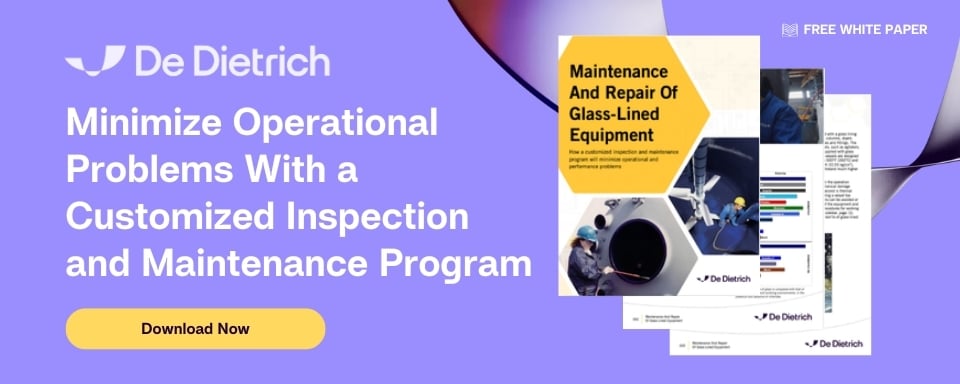Glass-Lining Maintenance: Extending Equipment Life & Performance
 Glass-lined equipment is widely used in various industries, particularly in chemical and pharmaceutical processing, due to its excellent corrosion resistance, durability, cleanability and versatility in handling a wide range of chemical reactions. To ensure the longevity and optimal performance of glass-lined vessels and equipment, regular maintenance is crucial. In this blog post, we will share some essential maintenance tips to extend the life of your glass-lined vessels and equipment, as well as some common maintenance challenges and how to overcome them.
Glass-lined equipment is widely used in various industries, particularly in chemical and pharmaceutical processing, due to its excellent corrosion resistance, durability, cleanability and versatility in handling a wide range of chemical reactions. To ensure the longevity and optimal performance of glass-lined vessels and equipment, regular maintenance is crucial. In this blog post, we will share some essential maintenance tips to extend the life of your glass-lined vessels and equipment, as well as some common maintenance challenges and how to overcome them.
1. Regular Inspection and Cleaning
|
Challenge |
Solution |
|
Residue build-up can obscure potential damage and reduce the efficiency of the equipment. |
Implement a cleaning schedule based on the type of materials processed and the frequency of use. Use appropriate cleaning agents that do not damage the glass lining. |
Tip: Conducting regular visual inspections of the glass-lined surfaces will help to detect any signs of damage or wear, such as cracks, chips or blisters (spark testing or hydrostatic testing methods can also be conducted to detect any defects in the glass lining). Schedule routine cleanings to prevent build-up of residues and ensure the equipment remains in good working condition. For any cleaning questions, contact the manufacturer. De Dietrich provides a comprehensive guide on how to clean glass-lined equipment effectively and safely.
2. Monitor pH Levels and Temperature
|
Challenge |
Solution |
|
Fluctuations in operating conditions can cause thermal shock or chemical attack on the glass lining. |
Use monitoring systems to continuously track pH and temperature levels. Implement alarms for any deviations beyond the safe operating range. |
Tip: Maintain the appropriate pH levels and temperature conditions as specified by the manufacturer. Extreme pH levels and temperatures can damage the glass lining. Additionally, you want to monitor and control the concentration of reactants and products. Ensure that your glass-lined equipment is compatible with the chemicals and processes you are using and consult the technical data sheets for the specific glass type and grade you have.
3. Avoid Mechanical and Stress
|
Challenge |
Solution |
|
Mechanical damage can occur during routine operations, leading to cracks or chipping of the glass lining. |
Train personnel on proper handling techniques and use protective liners or cushioning materials where necessary to prevent impact damage. |
Tip: Protect your glass-lined equipment from mechanical shock, which can cause fractures in the glass lining. Avoid dropping or hitting your glass-lined vessels and equipment with hard objects to prevent any sudden impacts.
4. Routine Maintenance and Repairs
|
Challenge |
Solution |
|
Identifying and accessing damaged areas for repair can be difficult, especially if the equipment is large or complex. |
Use non-destructive testing methods, such as low voltage spark testing, to locate damage without dismantling the equipment. Employ trained professionals for precise repair work. |
Tip: Schedule routine maintenance checks and promptly address any repairs needed. Small issues can escalate if not addressed in a timely manner. Repair any damaged areas as soon as possible, using appropriate patching materials and techniques. De Dietrich offers a range of repair solutions, including tantalum plugs and patches as well as epoxy resin cement patches. It’s also beneficial to plan maintenance activities during scheduled downtimes or off-peak periods. The use of predictive maintenance techniques can help to anticipate issues and address them before they lead to unscheduled downtimes.
5. Proper Storage and Handling of Spare Parts
|
Challenge |
Solution |
|
Improper storage can lead to deterioration of spare parts, making them unusable when required. |
Keep spare parts in a controlled environment, free from excessive moisture, dust, and temperature fluctuations. |
Tip: Store spare parts, such as gaskets and seals, in proper conditions to ensure they are in optimal condition when needed. Regularly inspect spare parts for any signs of degradation.
6. Documentation and Training
|
Challenge |
Solution |
|
Lack of documentation can lead to missed maintenance schedules and inadequate training can result in improper handling.
|
Implement a maintenance management system to track all activities and ensure compliance with schedules. Conduct regular training sessions and refreshers to keep staff informed about the latest maintenance techniques and safety protocols. |
Tip: Maintain detailed records of all maintenance activities, inspections, and repairs. Provide ongoing training for staff on maintenance best practices.
Proper maintenance of glass-lined equipment is essential for extending its lifespan and ensuring reliable performance. By following these best practices and addressing common challenges proactively, you can maintain the integrity and efficiency of your glass-lined vessels and equipment, ultimately contributing to the smooth operation of your processes and the overall success of your business.
For more detailed information or assistance with your glass-lined equipment maintenance, feel free to contact us at De Dietrich. We are here to support you with expert advice and services tailored to your specific needs.
